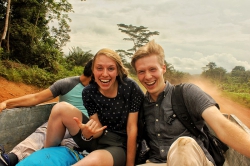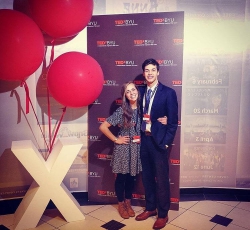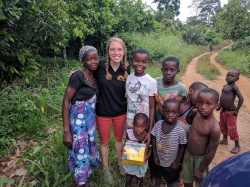Do Good. Better in Your Relationships
PROVO, Utah – Feb 13, 2018 – The Ballard Center for Economic Self-Reliance has a growing influence on BYU campus and around the world, but what most don’t realize is that it also impacts the relationships of its employees.
Enhances Our Quality Time
When Ariana Rosenberg returned to BYU after her mission, she heard about the Y-Prize Solar Challenge—a program through the Ballard Center that enables students to distribute solar lamps to African communities. As she learned that kerosene lamps are predominately used in the region and are both expensive and a health hazard (indoor air pollution kills more people than malaria), Ariana recruited old friends from her hometown in Virginia to join her team. Cole Rosenberg accepted and became one of the co-founders of Yenso Solar, a social business providing solar lamps to rural Ghanaians.
While they worked on Yenso together, Cole and Ariana fell in love—with social entrepreneurship and each other. Their intrinsic desires to do good brought them to the Ballard Center as individuals, but the common goals they shared through participating in the Ballard Center ultimately united them as a couple.
“Do Good. Better is the mission of the Ballard Center, but it is also the mission of our home,” says Cole, an economics junior. “Whenever you unite in a common cause and you have to sacrifice and work together, it builds your relationship and brings you closer to one another.”
Deepens Our Conversations
Cole and Ariana are not the only duo brought together by doing good through the Ballard Center. Chloe Saunders (a Do Good. Better teaching assistant) and Jace Saunders (an intern at Ballard Center partner, University Impact) have grown closer in their marriage as they have learned more about social issues.
“Since we work together on the Social Innovation Leadership Council and we both work at the Ballard Center, it brings up discussions about important things like what our views on social issues around the world are and how we can solve those issues,” says Chloe, a marketing senior. “It gives us a united long-term goal.”
Chloe and Jace are building friendships and giving personalized service in the Japanese ward they are currently attending using principles—such as human-centered design—that they learned from the Ballard Center. Their perspective has broadened as they’ve seen that principles of social innovation are effective no matter what their role or context.
Increases Our Empathy
Social innovation principles not only help solve world problems, but they can also help individuals become better spouses, family members, and friends. Greg Hutchins, a former Do Good. Better teaching assistant, sees how the principles he learned at the Ballard Center have helped him and his girlfriend, Michaela Proctor, who also works at the Ballard Center, empathize within their relationship.
“The fact that we share an interest in social issues has assured me of who she is and has helped her know who I am,” says Hutchins, a pre-management major. “We care about others and the problems people face, and that builds trust. I know that when I go through a personal trial, she will not only be there, but she will also use her skills and talents to help and love me in just the right way so we overcome the trial together.”
Whether it be a worldwide movement or small efforts within your own relationships and homes, everyone can help to solve social problems. While the Ballard Center connects students to classes, programs, and internships, the center also connects students with each other.



Media Contact: Alicia Gettys (801) 422-9009
Writer: Michaela Proctor



